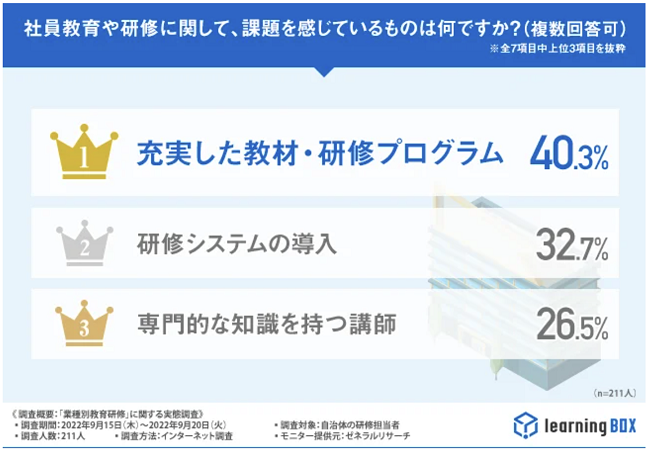LearningBOX, Inc. recently conducted a survey of training personnel regarding "education and training by industry.
In this issue, we will publish the results for municipalities.

Survey Results Topics
The most common difficulty in creating questions for training was "coming up with training content.
About 40% of training personnel in local governments feel that "well-developed teaching materials and training programs" are a challenge.
<Survey Summary
1. survey method: web-based questionnaire using monitors from General Research Corporation
2. survey target: training staff of local governments among General Research's registered monitors
3. number of valid responses: 211
4. survey dates: September 15, 2022 (Thursday) to September 20, 2022 (Tuesday)
The most common difficulty in creating questions for training was "coming up with training content".
A survey of 211 municipal training personnel was conducted.
More than 80% of the respondents answered "in-house training (85.8%)" as the training format.
Some excerpts of the content are
Understanding the local community (30s / Fukui Pref.)
Compliance (40s / Miyagi)
Local government, finance, hospitality (40s / Kanagawa Prefecture)
Human rights awareness (50s / Kanagawa Prefecture)
Fostering professional ethics (50s / Tochigi)
The training seems to focus on the following points.
Furthermore, about 70% (68.7%) of the respondents change the content of their training every year, and while more than 80% (86.7%) said that it should be changed every year, about 30% (31.3%) have not been able to do so.
When asked about the difficulties they face in creating questions for training, the most common response was "devising training content (47.9%)," followed by "assembling training content (37.4%)" and "setting a schedule within a limited training period (34.6%).
Nearly half of the respondents indicated that they originated the training content.
They seem to be struggling with what content to include to make the training useful and fulfilling in the field, while adapting it to the changing circumstances and realities of the local government as appropriate.
About 40% of training personnel in local governments feel that they are faced with the challenge of "well-developed teaching materials and training programs.

As for issues they are facing with regard to employee education and training, the most common response was "well-developed teaching materials and training programs (40.3%)," followed by "instructors with specialized knowledge (32.7%)" and "understanding and cooperation with on-site training (26.5%).
Municipal employees are also required to have a wide range of expertise and other knowledge related to public administration, and it is important to ensure that training programs are well-developed and that the content is easy to learn.
Specifically.
Knowledge gained is not accompanied by skills (20s / Kyoto, Japan)
There are issues with subject matter expertise (30s / Kyoto)
Issues are extracted from the gap between the ideal and the reality, but the themes must be quite generic to fit more staff (40s/Tokyo).
We would like to invite outside lecturers, but it is difficult to do so (40s/Tochigi).
... Even though hospitality training and professional people came, they are not suited to the business (50s / Aichi Prefecture).
They feel that they are facing challenges in this regard.
Finally, we asked about specific things they do to make education and training meaningful.
Planning training programs as needed based on staff questionnaires (30s/Kyoto)
Distribution of training materials in advance and mandatory submission of course reports after the training (40s/Tokyo).
E-learning (50s / Osaka)
On-site education and practice (50s / Nagasaki)
The respondents answered that they were not sure.
There is a gap between what an ideal training program should be and what it actually is, and it is often difficult to be realistic.
Under such circumstances, we found that the training program is being conducted in a creative manner, such as collecting questionnaires and reports, increasing opportunities for practical training, and emphasizing the improvement of practical skills, in order to improve the issues and the quality of the training as much as possible.
Summary: Municipalities have a sense of challenge in terms of the professionalism of training content and the lack of practical skills of their staff.
We found that more than 80% of education and training in the municipality is conducted in-house.
While more than 80% of the respondents believe that the content of annual training should be changed, about 30% said that they have not been able to change it.
As for issues in training, some respondents cited "well-developed teaching materials and training programs," while others felt that subject matter expertise was problematic.
The participants wanted to develop skills that would be useful in the actual workplace after the training, and although more specialized training and training that also focuses on practical training would be ideal, the selection of suitable instructors and the lack of practical skills of the staff were found to be problematic.